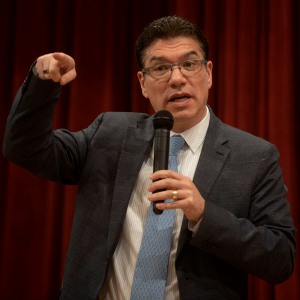Guest columnist John Paradis: How Republicans plan to dismantle VA health care

The Edward P. Boland Veterans Affairs Medical Center in Leeds, home of the VA Central Western Massachusetts Health Care System. STAFF FILE PHOTO
| Published: 02-28-2025 5:27 PM |
A recent news article in the Gazette made it appear that all may be well with the state of employee morale and welfare at the Veterans Health Administration medical center in Leeds.
The article reported that none of the more than 1,000 employees first dismissed by the U.S. Department of Veterans Affairs in the Trump Administration’s purge of the federal workforce work at VA medical facilities in our region.
But since then, there has been confirmation that at least one employee, a combat veteran who worked at the Springfield Vet Center, has been fired, and there may be many more dismissals. That is despicable on so many levels, but there’s another significant threat to veterans’ health care that is percolating in Washington. Congressional Republicans are putting into motion a plan to privatize VA health care.
The doublespeak being used is legislation titled the Veterans’ ACCESS Act, which would, over time, dismantle the VA’s integrated health care system and replace it with so-called “community care” — the VA euphemism for private health care.
On the surface, the legislation would appear to be a good thing for veterans, allowing veterans with addiction and mental health challenges to get unfettered access to outpatient treatment in the community without VA authorization or referral. The legislation would force the VA to pay the bills.
But policy experts say the true intent behind the bill is a “Trojan horse sneak attack.” That’s the description used by Russell B. Lemle, a senior policy analyst at the Veterans Healthcare Policy Institute.
Over the course of about three years, the legislation will create a new system that encompasses all medical care and that fundamentally transforms VA’s current mission as a health care provider to essentially an “insurance company writing checks,” Lemle says.
“Follow the money, which will hemorrhage from the VA to the private sector,” Lemle writes in Military.com, a popular news site for active-duty military and veterans.
Article continues after...
Yesterday's Most Read Articles
 Northampton Housing Authority boss placed on leave
Northampton Housing Authority boss placed on leave
 Hopeful buyers emerge for Magic Wings butterfly conservatory in South Deerfield
Hopeful buyers emerge for Magic Wings butterfly conservatory in South Deerfield
 UMass Chancellor Reyes outlines changes amid financial uncertainty under Trump administration
UMass Chancellor Reyes outlines changes amid financial uncertainty under Trump administration
 Ready to roll on roads: Amherst priority list tees up $4.55M to rebuild some of town’s worst stretches
Ready to roll on roads: Amherst priority list tees up $4.55M to rebuild some of town’s worst stretches
 UMass hockey: Minutemen fall to Western Michigan, 2-1, in Fargo Regional final
UMass hockey: Minutemen fall to Western Michigan, 2-1, in Fargo Regional final
 Amherst School Committee OK’s budget with no classroom layoffs, but spending plan is $500K more than town recommends
Amherst School Committee OK’s budget with no classroom layoffs, but spending plan is $500K more than town recommends
“The likely outcome is that the VA will close its inpatient services and instead become a sprawling assortment of outpatient clinics. If that sounds familiar, it is the plan laid out in the Project 2025 playbook. Veterans are being hoodwinked that the VA facilities they rely on won’t be impacted. Don’t buy it for a second.”
If this happens, it will drastically change how veterans in western Massachusetts receive care. The VA Central Western Massachusetts Healthcare System has already withstood previous federal plans to close the Leeds medical center.
After a review from the first Trump administration that used outdated and incomplete data, it was proposed that the VA medical center could be closed and health care programs sent elsewhere in the VA or to the community.
That review was farcical for several reasons, not the least was the fact that more than $200 million in construction was invested in the facility over the past several years. The closing would have created significant hardship for many veterans living in rural areas in our region and despite multiple studies that show it costs the government more to have veterans treated at a private facility instead of a VA facility.
With U.S. Rep. Jim McGovern’s help, the center stayed intact, but now there’s a new Trump administration and now a brand-new push to shutter VA health care. Many believe the end state, this time, will be the eventual hollowing out of VA care until it is gutted for private health care.
Last year, independent health care experts studying Project 2025 warned that the survival of the VA system faces its demise if the VA is forced to pay for more and more runaway community care.
The VA would, in essence, become an insurance agency, sending veterans out to the community where there are often shortages in care and where there is already a lack of various specialties.
Anyone who has tried to get a primary care physician or a neurology or dermatology appointment or a psychiatrist knows how hard it can be to get an appointment at times. Sending more veterans out for care will not work. The nation’s health care system cannot absorb the millions of veterans needing appointments.
Another factor is the influx of nearly 400,000 newly enrolled veterans from The Promise to Address Comprehensive Toxics Act, passed in August 2022, and known as the PACT Act. The act deemed 23 illnesses, such as lung cancer, to be service related for veterans who were exposed to burn pits during deployments to places like Iraq and Afghanistan.
The Senate last week rejected a non-binding resolution by a 52-47 vote to “ensure full and uninterrupted funding” for health care provided by the PACT Act. Republicans overwhelmingly voted against it.
This is a slap in the face to the nearly 3.5 million American veterans who were exposed to burn pits and other airborne hazards during conflicts in the last two decades. The PACT Act also helped Vietnam War veterans get health care from their exposure to the Agent Orange defoliant used during the war.
The Veterans Health Administration needs to expand its workforce, not shrink it. What is clear is that without a substantial addition of health care personnel, the VA will need to curtail services that veterans depend on. If veterans want to keep what they have, they need to make noise now.
John Paradis is a retired Air Force lieutenant colonel. He is a member of VoteVets, a home for progressive veterans, military families and their civilian supporters. He lives in Florence.






 Columnist Richard Fein: Ukraine — Prepared to fight but ready for peace
Columnist Richard Fein: Ukraine — Prepared to fight but ready for peace Kathe Geist: Hypocrisy on display
Kathe Geist: Hypocrisy on display Gordon Humphrey: On owning things
Gordon Humphrey: On owning things Eliot Sanborn: Dear ChatGPT: A writer’s plea
Eliot Sanborn: Dear ChatGPT: A writer’s plea
